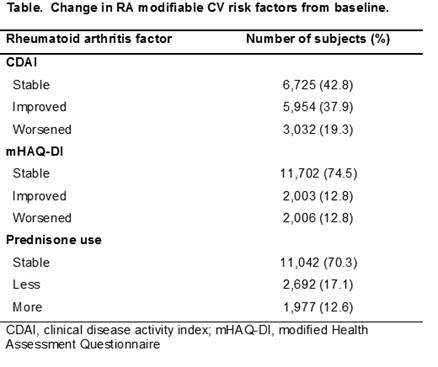Session Information
Session Type: ACR Poster Session A
Session Time: 9:00AM-11:00AM
Background/Purpose: Cardiovascular disease (CVD) is a major source of morbidity and mortality in RA, but current management goals follow general population recommendations without tailoring based on RA characteristics. The published and internally validated Expanded Risk Score for CVD in RA (ERS-RA) may provide useful information for CVD management. The ERS-RA identified 3 modifiable RA factors at baseline which were predictive of future CV risk: prednisone use, functional status as defined by the health assessment questionnaire disability index (HAQ-DI), and the clinical disease activity index (CDAI). We examined whether changes after baseline in these modifiable RA factors correlate with changes in CVD risk.
Methods: Using data from a large RA registry of 15,711 subjects recruited from rheumatology practices in North America, we categorized 10-year risk of CVD using the ERS-RA. We then used Cox proportional hazards regression to determine if adding information on RA factors during follow-up, had effects on relative risk of CV events (MI, stroke, CV death). Changes in the three modifiable factors were categorized as follows: prednisone use was noted as unchanged, increased if daily dose was increased by at least 25%, or decreased if lowered by at least 25%; HAQ-DI score were categorized as unchanged, increased if higher by at least 0.5 units, or reduced if lowered by at least 0.5; and CDAI was categorized as unchanged, increased if higher by at least 25%, or decreased if lower by 25%. Cox proportional hazards models were fit using updated information on the three RA factors using information updated every six months. Hazard ratios were estimated worsened or improved values, compared with no change from baseline.
Results: Median follow-up in this cohort was 34 months with 53,861 person-years of follow-up. During this period, 342 CV events were confirmed for an overall incidence rate of 6.35 per 1,000 person-years (95% CI 5.71 -7.06). The Table illustrates the considerable changes in RA factors after baseline, with more than half of subjects demonstrating changes in CDAI, 30% in prednisone use, and 26% in HAQ-DI. Multivariable hazard ratios demonstrate a 30% reduction in CV risk for subjects with reduction in HAQ-DI (95% CI 0.46 – 1.06) and a 56% increase in risk for subjects with increased prednisone dosage (95% CI 1.12 – 2.16).
Conclusion: Cardiovascular risk appears to be modifiable for patients with RA. These preliminary analyses suggest that improvements in HAQ-DI score and reduced prednisone dose may be associated with reduced CV risk overtime. If confirmed, this information may provide useful evidence for constructing CV risk management recommendations specific to RA. 
To cite this abstract in AMA style:
Liao K, Etzel CJ, Greenberg JD, Guan H, Kremer J, Solomon DH. Modifiable Rheumatoid Arthritis Factors and Impact on Cardiovascular Risk [abstract]. Arthritis Rheumatol. 2016; 68 (suppl 10). https://acrabstracts.org/abstract/modifiable-rheumatoid-arthritis-factors-and-impact-on-cardiovascular-risk/. Accessed .« Back to 2016 ACR/ARHP Annual Meeting
ACR Meeting Abstracts - https://acrabstracts.org/abstract/modifiable-rheumatoid-arthritis-factors-and-impact-on-cardiovascular-risk/
